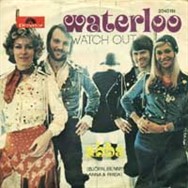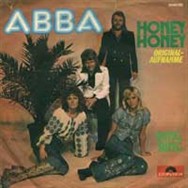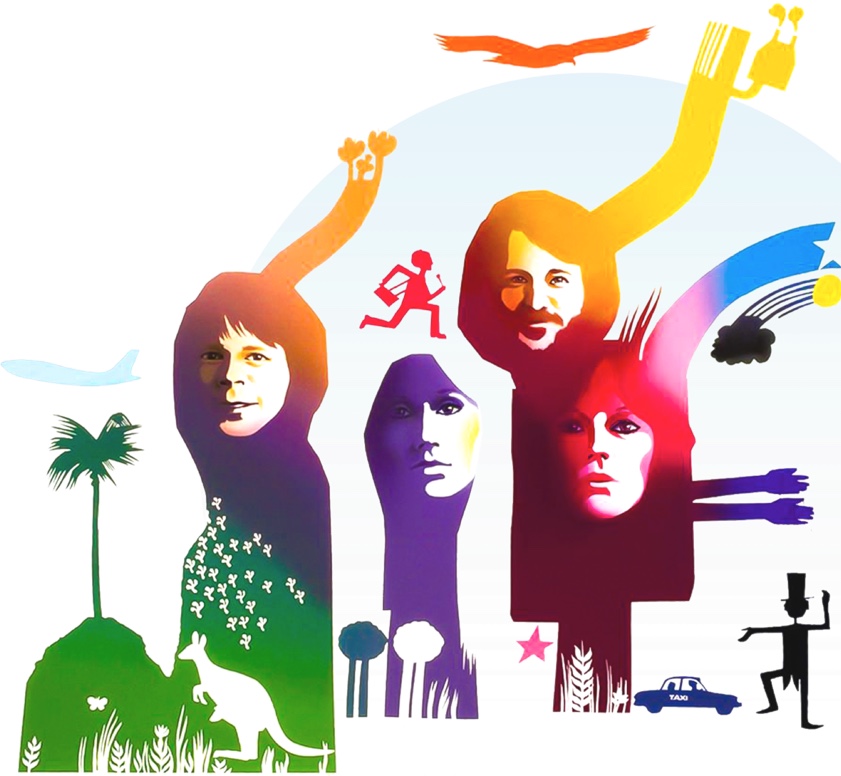In Focus: Waterloo!
On April 6, 1974 ABBA won the Eurovision Song Contest with Waterloo. The circumstances leading up to this international breakthrough were described in previous pieces about People Need Love and Ring Ring (both available in the In Focus archive). In this feature we take a look at the events surrounding Waterloo – the song, the album, and the Brighton triumph.
 Big hits and a new name
Big hits and a new name
April 6, 1974, was one of the truly unforgettable nights in the history of the Eurovision Song Contest. In the midst of a polite and well-behaved line-up of artists, two men and two women rushed on to the stage at The Dome in Brighton, England. The group was wearing the glammest, most glittering costumes this side of The Sweet, Gary Glitter and David Bowie. The sweet ballads and snappy Eurostompers that dominated the rest of that evening were brutally swept aside as the group burst into a song that forged a rocky beat with a catchy pop tune, all wrapped in a package of irresistible energy. The group and the song? ABBA, of course, and ‘Waterloo’. Needless to say, the group were that year’s victors in the Eurovision Song Contest, and the breakthrough they achieved gave them a worldwide mega-hit, the first in a long row of international smashes.
 That moment in Brighton was the culmination of a process that had been going on for the past year, ever since the group failed to qualify for the contest with their previous submission, the 1973 song ‘Ring Ring’. However, it would be wrong to say that ‘Ring Ring’ had been a waste of time, for the song gave the group a massive hit in their native Sweden. Björn and Benny, Agnetha and Anni-Frid, as they were known back then, certainly sold more singles and albums than any other artist that year, and were able to embark on a successful summer tour. The only problem was the group name: they needed something that was less of a mouthful and a little more snappy. A competition was held in a newspaper, but that didn’t seem to bring any usable results: Baba or Friends and Neighbours, anyone? It seems that it was Stig Anderson, the group’s manager, who found the best solution. He simply jumbled around the first letters in each of the member’s first names – and came up with ABBA.
That moment in Brighton was the culmination of a process that had been going on for the past year, ever since the group failed to qualify for the contest with their previous submission, the 1973 song ‘Ring Ring’. However, it would be wrong to say that ‘Ring Ring’ had been a waste of time, for the song gave the group a massive hit in their native Sweden. Björn and Benny, Agnetha and Anni-Frid, as they were known back then, certainly sold more singles and albums than any other artist that year, and were able to embark on a successful summer tour. The only problem was the group name: they needed something that was less of a mouthful and a little more snappy. A competition was held in a newspaper, but that didn’t seem to bring any usable results: Baba or Friends and Neighbours, anyone? It seems that it was Stig Anderson, the group’s manager, who found the best solution. He simply jumbled around the first letters in each of the member’s first names – and came up with ABBA.
 Finally facing his Waterloo
Finally facing his Waterloo
In September 1973, shortly after the group had completed their summer tour, they began work on their next album. Björn, Benny and Stig also had a parellel goal: coming up with a brand new song that could give them another shot at the Eurovision Song Contest. They had to place this much importance on the contest, simply because this was about the only way they could hope to attract massive attention from an international audience. In the early 1970s, few pop or rock groups outside the English-speaking world were taken seriously by the international music business. Trying to get attention through traditional channels – British or American record companies, publishers and media – was virtually impossible for a Swedish band. Stig Anderson was well aware that winning the contest wouldn’t necessarily have to be their ultimate goal – previous years had proven that the runners-up often became bigger international hits than the victors, so the exposure was what they were after, the chance to use the contest as a platform from which they could take the next step.
However, it took a while before the songwriting team came up with a song that would be perfect for the Eurovision Song Contest. The first track to be written and recorded for the new album was ‘Dance (While The Music Still Goes On)’ – a good start. “It’s very close to those early sixties Phil Spector type of songs that we really liked,” Björn later recalled. In mid-October, sessions continued with ‘Suzy-Hang-Around’ (featuring Benny’s only solo lead vocal on an ABBA album), ‘My Mama Said’, ‘What About Livingstone’ and the ultra-catchy ‘Honey, Honey’. Then, in November and December, ‘King Kong Song’ and Frida’s showcase ballad, ‘Gonna Sing You My Lovesong’, were completed. Still, although there were a couple of really strong tracks in there, the Andersson/Anderson/Ulvaeus songwriting team were still not satisfied that they had found the perfect song for the contest.
Björn and Benny retreated to their songwriting cottage on the Stockholm archipelago island of Viggsö, and quickly came up with a batch of new tunes. One of them, an uptempo, rocky number, seemed to be the right song with which to make an impression on the European television audience. Armed with a cassette tape demo of Björn and Benny humming and strumming their way through the tune, Stig Anderson set to work on the lyrics. The song was catchy, and Stig knew the importance of matching such a tune with equally catchy lyrics – above all, it was vital to find the right title.
At first, he landed on ‘Honey Pie’, but that just didn’t seem right; to Stig, it didn’t trigger any lyric suggestions. In the early hours of a Saturday morning, leafing through a book of familiar quotations, he finally found the word he had been searching for: ”Waterloo.” The concept, of course, referred to Napoleon Bonaparte’s legendary defeat by British and German forces at the battle near the Belgian town on June 18, 1815. Stig used that historical event as a metaphor for a girl surrendering to the courting of an insistent suitor, and before the day was over, the lyrics had been completed. Just a week before Christmas, the song was recorded at Metronome Studio in Stockholm. With an exuberant vocal performance from Agnetha and Frida added, ABBA had a track that was a winner in every sense of the word.
 Who’s gonna love it?
Who’s gonna love it?
However, the recent songwriting sessions had yielded a couple of other songs as well, one of which carried the working title ‘Who’s Gonna Love You’. The backing track for this mid-tempo ballad was recorded the day after ‘Waterloo’. Listening back to the tape after the session, the track triggered something in Björn and Benny. They realised that ‘Who’s Gonna Love You’ would be just as suitable for the Eurovision Song Contest as the rocking rhythms of ‘Waterloo’, perhaps even more so. Stig Anderson, who was headed for a Christmas holiday trip to the Canary Islands, had a cassette tape with the backing track thrust in his hand just as he was about to leave. His task, as usual, was to come up with suitable lyrics. In the Canary Islands, Stig kept hearing the phrase ”hasta mañana”, meaning ”see you tomorrow”, on the radio. He quickly put together the lyrics for the new song, and dictated them down a crackly telephone line between Spain and Sweden. ‘Who’s Gonna Love You’ had become ‘Hasta Mañana’. The song was soon recorded, adorned with a captivating lead vocal performance from Agnetha.
 Björn, Benny and Stig now found themselves with a problem to solve. Should a “safe” tune like ‘Hasta Mañana’ be their submission to the Swedish Eurovision Song Contest heats? After all, it was in line with the previous four years’ winning entries: a female solo performance of a slow to mid-tempo ballad. Or was it better to go with ‘Waterloo’, precisely because it broke with the Eurovision tradition? After agonising a bit, they decided to go out on a limb and place their bets on the rock tune, not least because the song focused on both Frida and Agnetha as lead vocalists, which meant that the actual performance of the song would work much better.
Björn, Benny and Stig now found themselves with a problem to solve. Should a “safe” tune like ‘Hasta Mañana’ be their submission to the Swedish Eurovision Song Contest heats? After all, it was in line with the previous four years’ winning entries: a female solo performance of a slow to mid-tempo ballad. Or was it better to go with ‘Waterloo’, precisely because it broke with the Eurovision tradition? After agonising a bit, they decided to go out on a limb and place their bets on the rock tune, not least because the song focused on both Frida and Agnetha as lead vocalists, which meant that the actual performance of the song would work much better.
 He can’t be the songwriter!
He can’t be the songwriter!
It proved to be the correct choice. ABBA and ‘Waterloo’ sailed through the Swedish heats on February 9, 1974, scoring an overwhelming victory over the other contestants. And then, finally, came that fateful day on April 6 when the time had come to win over the Eurovision juries – and, above all, the European television viewers. It was an irresistible package: a catchy song, unforgettably zany costumes – created by clothes designer Inger Svenneke – and a zestful performance that smashed right through the television screens. Once all the contestants had performed their entries, it was time for the voting – a nerve-racking process for most of the group. Björn was so nervous that at first he didn’t want to watch the proceedings. In the end though, he couldn’t keep himself from grouping around the monitor together with Benny, Agnetha and Frida, biting his nails all the way through. ”No-one can imagine the tension of such an event,” he said. ”Your skin crawls, your stomach knots up and your throat gets all dry. You want to run away from it all, at the same time as you’re standing there transfixed and spellbound. Believe me, it’s a real ordeal.” Only Frida managed to keep her cool. ”I was surprised at myself because I believe I was pretty ice-cold,” she recalled. ”The reaction didn’t come until afterwards. It was hard to believe that we had won this major contest.”
Stig rushed onstage to accept his songwriting award and proceeded to repeat the phrase ”thank you” in the languages of several of the participating countries. He had rehearsed the phrases earlier in the afternoon when he thought he should prepare in some way for the eventuality of winning. The awards ceremony became somewhat anticlimactic for the other two songwriters. When Björn and Benny tried to get on stage, they were held back by security guards who insisted that ”only the composers are allowed on stage” for the ceremony. The guards were holding on to their legs as they were trying to climb the short steps leading to the stage. ”The guard [said], ‘You’re not a writer, you’ve misunderstood this, you dumb Swede! You have to wait’,” Björn recalled. ”The way I was dressed he would have thought, ‘He can’t be the writer.’”
In the hours after the contest, most of the group were swept away as if in a hazy dream. Björn and Benny remembered how they were both convinced that someone would soon tell them that the votes had been incorrectly calculated. Agnetha called her parents, crying with joy down the telephone line. It was a night ABBA would never forget.
The triumph in Brighton achieved results beyond anything anyone had dared hope for. The ‘Waterloo’ single charted highly everywhere – including the United States, Australia and a host of other countries where Eurovision was a largely unknown event – hitting number one in at least seven nations. ABBA had scored their first major global hit, finally proving that it was possible to break the boundaries imposed upon them by the international record business. The Waterloo album, first released in Sweden on March 4, achieved Top Ten placings in Europe and, at the height of Abbamania a few years later, it reached the Top 20 in Australia.
The door had been opened – and ABBA certainly weren’t going to let anyone close it ever again.

